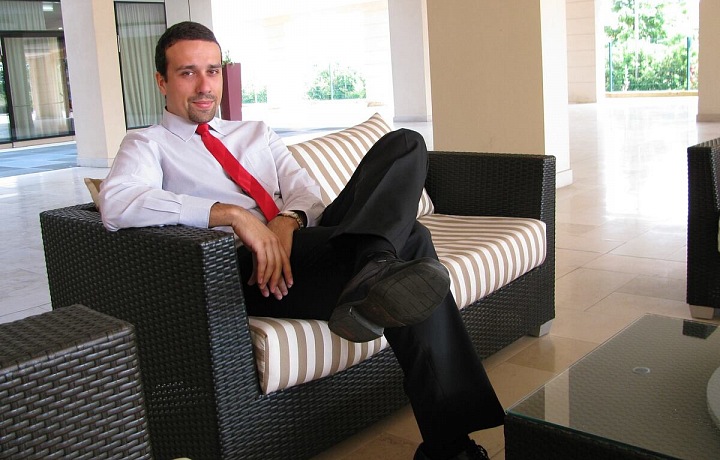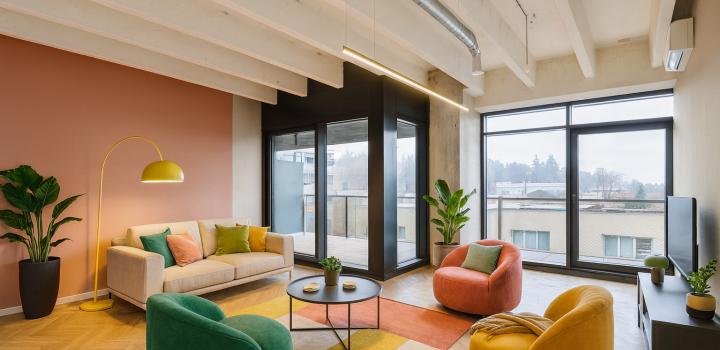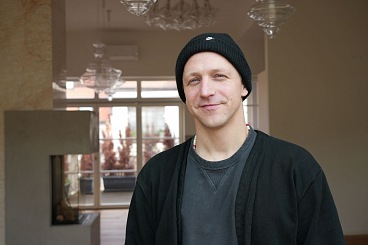Fast Confession - pulmonologist Milan Sova: During the coronavirus pandemic, children may gain up to 10 kilos
Despite being relatively young, doctor Milan Sova has already achieved a lot. He is the head of the Department of Lung Diseases and Tuberculosis at the University Hospital Olomouc and also the chairman of the Czech Alliance against Chronic Respiratory Diseases. At the moment, of course, the coronavirus keeps him occupied more than anything else. In the interview for LP-Life.com, he didn't forget to mention the consequences of the pandemic, which aren't being discussed as much as they should be...
You've certainly accomplished a lot at your young age. What all do you do for a living?
My field of work is pneumology, mainly sleep medicine, chronic obstructive pulmonary disease, and interventional bronchology. The work I do for the Czech Alliance against Respiratory Diseases takes a large portion of my time, too.
You seem to have a lot on your plate, but lungs and sleep apnea don't have much in common, do they?
It's really simple, it's about sleep-related breathing disorders, which are primarily of pulmonary origin. Sleep medicine as such is a multidisciplinary field. Although it covers many neurological diseases and psychiatric disorders, currently the largest area of its concern is sleep-disordered breathing. This includes, for example, obesity hypoventilation syndrome and chronic respiratory failure in chronic obstructive pulmonary disease, as well. All these diagnoses require us to provide patients with ventilatory support, which is possible using various devices.
So, if my husband, father, or grandfather snores, it's not just because of their age, but they can have a serious problem?
Exactly. It's important to determine whether they just snore or their breathing repeatedly stops and starts during sleep. You would definitely recognize whether your partner breathes regularly at night or not. If not, it's a good reason to have him examined. Indeed, obstructive sleep apnea can lead to myocardial infarction or increase the risk of stroke and many other complications. Snoring as such is considered to be just a cosmetic problem. On the other hand, we can treat it properly. If you'd like, you can definitely set up an appointment with us for your partner.
Not only men, women too suffer from snoring
Of course, women snore too.
Who snores more?
Definitely men. It is related to the male gender, being overweight and having a short, thick neck. These characteristics precisely describe people at high risk for obstructive sleep apnea. Typically, it's a man who's been snoring since he was young, his friends had told him during the compulsory military service, and over time, he starts suffering from sleep apnea. This is the moment when we step into the process, establish a diagnosis and start treatment.
For how long has this been a known issue?
You might be surprised, but the first description of obstructive sleep apnea syndrome can be found in literature from about 2000 B.C., where it is written that a king of Pontus did not breathe at night and allegedly, his subjects used to stab him with needles, in order to prevent him from suffocation. That is history. In practice, sleep-disordered breathing was not treated until the 1990s. Until then, we knew that obstructive sleep apnea existed and in America, in the 1970s, tracheostomy was the preferred solution for the condition. However, since 1989, we have had machines available to treat patients routinely. The treatment consists of applying overpressure through a mask.
That must be unpleasant.
You'd be surprised, most patients sleep quite well. The most common symptoms of obstructive sleep apnea are feelings of fatigue during the day and excessive daytime sleepiness. These are people who can fall asleep while talking to you. It significantly reduces their quality of life. Once we start treatment, we are able to eliminate those problems for most of our patients. Patients often report that they haven't slept so well in 20 years, so some even look forward to using the device. At night, they sleep with a mask. They're satisfied with it. In addition, their partners are happy that the patient does not snore anymore. It is something that really improves their quality of life. Many diseases are such that patients do not know whether they are being treated or not, but in obstructive sleep apnea, if the treatment fits the patient, we really bring them back to life and they feel very good.
Let's talk about coronavirus now. There were large outbreaks in Moravia. What is the situation now, in January 2021?
The situation is the same as anywhere else in the Czech Republic, now we are no different. It is true that having the town of Litovel in the neighbourhood played a significant role at the beginning of the "first wave". I say that the question is whether we even had a first wave because basically nothing much happened in the spring, there were very few cases. Litovel was the first town that went into complete lockdown. Nevertheless, we recorded some spicy cases where patients still came to our hospital riding a bicycle. They took advantage of the cycle path which goes through the Litovelské Pomoraví and was closed only a few days later. Now the situation is the same as anywhere else.
Do you know if you've already had COVID-19 yourself?
I'm not aware of that.
You're not? It's possible to get tested for coronavirus antibodies.
It is, but I didn't get tested.
Why?
Because I have no symptoms. In fact, only a few doctors who work at our clinic got infected. Of course, we use protective equipment, but I also think we are very immune. And I mean it in a general sense, not specifically to coronavirus. We encounter potentially infectious patients throughout our professional lives, we are bound to become immune to a variety of diseases.
I assume you don't smoke.
You're right.
Coronavirus aside, do you Moravians have a stronger immune system thanks to "slivovice"?
We don't, the Moravian and Prague populations are no different.
Despite that, people strongly perceive the difference between Bohemia and Moravia, in many ways.
The same applies to Olomouc as a city and its surroundings. Olomouc is referred to as the "Heart of the Haná region", but the truth is that the real Haná is a bit farther away.
During Fast Confession, when I asked you about coronavirus vaccination, your response was positive. However, I felt like something was left unsaid.
It's very complicated. The current situation is difficult as there are not enough vaccines for everyone. It is not clear when a reasonable amount will be available, who should get vaccinated, and when. The Czech Vaccination Society says yes, let us all get vaccinated. The Czech Society of Allergology and Clinical Immunology recommends considering the state of antibodies… so, there are a few "buts".
Would you get vaccinated?
I haven't been vaccinated yet, it might change in the future.
That's a bit of an evasive answer.
It's not. There is a lack of vaccines today and I think there are others who need one more than me. It also depends on what types of vaccines will be available in the future. As of now, there are vaccines produced by Pfizer, and Moderna. Possibly there will be one made by Astra, too. Additional data about the vaccines are also needed. We will see.
You're a doctor, though. You are on the front line. You should have been vaccinated a long time ago.
It is true that I should or could be vaccinated. Then again, the problem is that there are not enough vaccines. In my opinion, as a young and healthy person, I can "sacrifice" myself for some of my older colleagues who can benefit from it more than me.
I've heard that past coronavirus infection affects you regardless of your health, age, or weight. Apparently, your chest X-ray will show lung anomalies. Are there any clinical studies that aim to find out whether coronavirus really has any long-lasting effects on the body?
There's a post-Covid consultation room in our hospital, where we have been monitoring patients since April when it was set up. Currently, over 600 patients have been examined. We've discovered significant impairment of pulmonary function in approximately 1-2% of the patients. We estimate that lung changes will occur in 0.1 to 0.5 percent of patients in the entire population. Fortunately, most of those changes are not permanent. It must be said that if we discover changes in the lungs, it does not mean that they will still be present in three months. At the same time, we cannot say that no changes mean the lungs will stay unaffected in the future, because we don't fully know the disease, yet.
What kind of changes are we talking about? Do people have scars on their lungs?
Precisely. X-ray sometimes shows pneumonia-like changes. In other words, there are post-inflammatory changes visible. The body defends itself. Then it heals itself. But as I said before, most of these changes disappear with time. When it comes to treatment, many patients are given, for example, systemic corticosteroids. The inflammation usually subsides then. Of course, it doesn't mean that there won't be any residual changes present in the form of small scars on the lungs. On the other hand, the same changes would be expected to appear if the patient experienced severe influenza or bacterial pneumonia, too. If we both got an HRCT chest scan done here and now, I believe we'd see one or two inflammatory strips in our lungs for sure. This could mean that we had mild pneumonia at some point in our lives without knowing it.
Are there such post-Covid establishments also in Prague and all over the country?
Of course. However, I can't give you an example off the top of my head.
Isn't 600 people a small sample?
It's a relatively large sample. Usually, scientific studies range from a hundred upwards, as that is considered sufficient to provide decent data. Six hundred people is an amazing sample and the examination is really thorough. Naturally, our fellow colleagues can have similar samples, but they might not necessarily run all the tests we do, considering immunity and so on. As of now, we have a sample of the entire population, i.e. there are representatives of all age groups. Six hundred people are enough, but of course, we continue to take on more. About 20 new people come to our post-Covid consultation room every day. That adds up to five hundred more people in a month, the number increases dramatically.
You will then probably need to consult the results with other clinics to create an overall output in a study that will be presented.
We can present our sample, they can present theirs, or we can put them together. Italians or the Chinese will have something else. Each population is different and has its own structure. Our sample is unique because of one thing, though. In the spring, we searched for people proactively, even among those with no symptoms. A positive PCR test helped with the search. Then there are groups of people who come to us only because they are sick and therefore seek consultation. If we look at the second case only, we will find that fifty percent of people have such and such issues. Statistically, it is not true, because when we recalculate the results for the whole large sample it is much less.
What is your personal opinion on coronavirus? Are we handling the situation well? I mean here in the Czech Republic, but also in the whole world. Is it the flu or a terrible pandemic?
It's a pandemic, a terrible pandemic and there's nothing funny about it. I would never downplay it, it is a disease that can kill a lot of people or cause severe health issues. On the other hand, what is happening here is not entirely appropriate. Nor is the attention that is given to the virus. It's as if no other diseases exist, there is simply nothing but COVID-19. Coronavirus mortality is similar to pandemic influenza. Overall mortality, that is. Not seasonal. People forget too easily. The 2009 swine flu pandemic was no fun either. However, it occurred at a time when social networks were not yet developed and the situation wasn't exaggerated.
What do I think about COVID-19? Above all, everyone should calm down. A really large group of people has formed, a group of experts who, although I do not want to disparage their experience, have never worked in a clinical environment, they've never treated living patients. At the same time, I'm not saying we clinical doctors are right, not at all. Nevertheless, those experts are biochemists, parasitologists, mathematicians, and based on their recommendations, the whole strategy is determined. The opinion of a clinical doctor, who's got experience with observing, treating patients with either active coronavirus infection, or post-COVID syndrome, is not taken for much. And what's more, the ongoing discussions have stopped making sense. As soon as someone has a slightly different opinion, the media automatically labels them as "deniers" who should keep their mouth shut. Yet, a healthy discussion is essential. We need to talk about what is happening, what isn't happening, and what the current situation is.
Aside from COVID-19, what else do you have to deal with at work? What percentage of your patients have been affected by the coronavirus crisis in a way that their surgeries and the like are postponed?
We counted it in the spring for the division of sleep medicine, even though it's just a slice of the spectrum of our care. We found out that in the whole country, approximately twenty percent of medical facilities have reduced or stopped providing care due to spring safety measures. It probably won't be possible to fill this gap in the healthcare system. Additionally, the situation in autumn made it even worse. Sleep laboratories throughout the country, with a few exceptions, are more or less closed. This alone affects a huge number of people who will not get diagnosed and treated. They would have been taken care of long ago if there was no pandemic. Granted, this is only a small subspecialty of medicine, but it reflects the overall situation in the healthcare industry. More issues arise when it comes to diseases like lung cancer, for example. Fellow oncologists say that many patients are afraid to be examined or the whole diagnostic process is prolonged. In the spring, everything was being postponed, which is fortunately no longer happening these days, but it can still be a problem for many patients.
How specifically has coronavirus affected your work as a lung doctor?
A lot, of course. There are pulmonary wards that have been turned into COVID-19 units. Our facility has not transformed into one, but our doctors, myself included, often serve in these units. It has affected us in a way that now we're taking care of a lot of people with the post-COVID syndrome. As for sleep medicine in 2020, we kept opening the department and then closing it again based on the decisions of the Ministry. Our secretary was doing nothing else but first scheduling and then cancelling the examinations.
On the one hand, thinking of the future of pulmonary medicine, this is a crisis. On the other hand, it is a great opportunity. At least there's a chance for us to show other colleagues and people that pulmonary, and respiratory medicine don't focus just on tuberculosis, which was the subject of discussions some time ago. Great progress has been made in the field of pulmonary medicine. Sleep medicine, non-invasive ventilatory support, asthma therapy, and chronic obstructive pulmonary disease therapy have all contributed to the development. These all are things we didn't have twenty years ago. Either not at all or not to the same extent as now. Coronavirus can move us forward, too. We provide exceptionally good care for patients who have recovered from the infection and it is necessary to communicate the fact to the public, and insurance companies. Respiratory medicine is not so "well-compensated" in comparison with other specialities.
Do you think that people realize coronavirus attacks the lungs and is a respiratory disease? And that they may stop smoking because of that?
No, I don't think so. On the contrary, I am afraid for our future. Lots of people have become lazy, stopped moving. My mother works at the Department of Sports Medicine and Cardiovascular Rehabilitation, where they have a weight loss program for children. She told me there had never been so many obese children. During the coronavirus pandemic, children may gain up to 10 kilos. We're talking "only" about children now, but it poses a serious question of what is going to happen with the whole population. A part of the population is economically ruined, another part is not used to working anymore. The children are also staying at home because their parents will not let them go out and social ties have been broken. I am curious about how our society will develop sociologically, economically, and in terms of public health.















